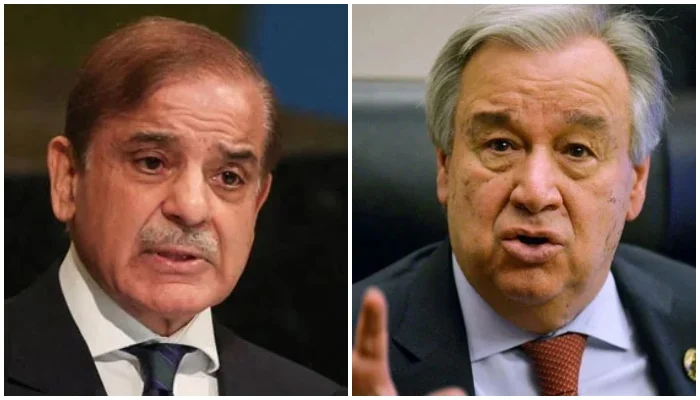Prime Minister Shehbaz Sharif held a telephone conversation with United Nations Secretary-General Antonio Guterres to exchange views on the situation in South Asia. This marked the third phone call between the two leaders within the past two weeks.
The prime minister expressed his deep appreciation for the secretary-general’s leadership and diplomatic efforts to de-escalate the tense situation in South Asia, which had been gravely endangered by India’s unprovoked and unjustified aggression against Pakistan. He stated that the secretary-general’s continued engagement and preventive diplomacy demonstrated his enduring commitment to upholding the principles and purposes of the UN Charter, as well as fostering peace in South Asia. The premier noted that Pakistan had agreed to the ceasefire understanding in the larger interest of regional peace. He reaffirmed Pakistan’s strong resolve to promote peace in South Asia, while defending its sovereignty and territorial integrity at all costs. PM Shehbaz denounced India’s aggression on the false pretext of terrorism, characterizing it as a dangerous precedent that the international community should duly acknowledge. He also expressed concerns over the continued provocative and inflammatory remarks by Indian leadership, which pose a threat to the fragile regional peace. He emphasized that the just resolution of the Jammu and Kashmir dispute, in accordance with UN Security Council resolutions, was imperative to ensuring durable peace in South Asia, urging the UN secretary-general to play his role in its just resolution. Guterres welcomed the ceasefire understanding, while expressing condolences over the loss of civilian lives. He expressed his commitment to continued engagement with both sides to advance regional peace and stability. The UN chief stated that it was his duty to work towards the promotion of international peace, a necessity for the world. Following the conversation, PM Shehbaz wrote in an X post: “I thanked UNSG @antonioguterres during my call to him today, for his leadership and intense diplomatic efforts that helped defuse the recent crisis in South Asia.” “I told him that while we exercised our right to self-defence under Article 51 of the UN Charter, Pakistan was committed to honouring the ceasefire understanding in the greater interest of regional peace. “The world has witnessed Pakistan’s responsible and measured actions during the past two weeks in the face of external military aggression. We will never allow violation of our sovereignty and territorial integrity,” he concluded. — X/@CMShehbaz Pakistan armed forces launched a large-scale retaliatory military action, named “Operation Bunyan-um-Marsoos”, and targeted several Indian military targets across multiple regions. The strikes, described by officials as “precise and proportionate”, were carried out in response to India’s continued aggression across the Line of Control (LoC) and within Pakistan’s sovereignty, which New Delhi claimed were aimed at “terrorist targets” in response to last month’s Pahalgam attack in the Indian Illegally Occupied Jammu and Kashmir (IIOJK). After at least 87 hours, the conflict between the two nuclear-armed nations ended on May 10 with a ceasefire agreement brokered by the United States.



